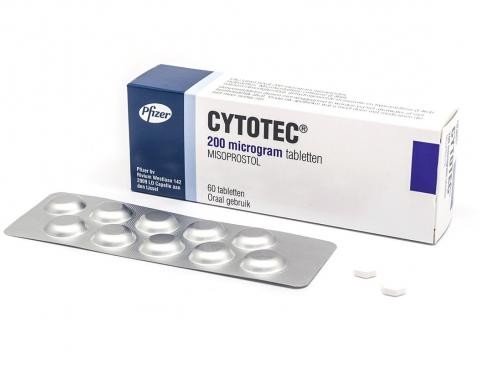Cytotec, containing the active ingredient misoprostol, is a synthetic prostaglandin E1 analog used for various medical purposes. Primarily, it prevents stomach ulcers in patients who regularly take NSAIDs (nonsteroidal anti-inflammatory drugs) like aspirin, ibuprofen, or naproxen, which can cause gastric irritation. Cytotec works by protecting the stomach lining and reducing stomach acid production. It is also utilized in obstetrics to induce labor, manage postpartum hemorrhage, and as part of medical abortion protocols. The medication is taken orally, typically with food to minimize stomach discomfort, and must be used under medical supervision due to potential side effects and contraindications.


Prevention of NSAID-Induced Ulcers
Cytotec is effective in preventing stomach ulcers in patients who require long-term NSAID therapy. These drugs can damage the stomach lining, leading to painful ulcers and gastrointestinal bleeding. Cytotec helps by increasing protective mucus production and reducing gastric acid secretion, lowering the risk of ulcer formation. It is particularly beneficial for those with a history of ulcers or at high risk for gastrointestinal complications.

Induction of Labor
In obstetric care, Cytotec is used to induce labor by ripening the cervix and stimulating uterine contractions. This application is valuable when there is a medical need to deliver the baby, such as in cases of prolonged pregnancy, premature rupture of membranes, or maternal health concerns. Cytotec offers an effective, controlled method for initiating labor, reducing the need for more invasive procedures.

Management of Postpartum Hemorrhage
Cytotec is also used to control postpartum hemorrhage, a leading cause of maternal mortality. The medication stimulates uterine contractions, helping to reduce blood loss after childbirth. It is particularly useful in low-resource settings where access to other uterotonic agents is limited, providing a cost-effective and easily administered solution for managing this potentially life-threatening condition.
Cytotec – Product Description
Overview:
Cytotec (misoprostol) is a versatile medication primarily known for its role in preventing NSAID-induced gastric ulcers. It is a synthetic prostaglandin E1 analog that mimics the natural protective substances found in the stomach, helping to maintain the stomach lining’s integrity and reduce acid secretion. Beyond its gastrointestinal applications, Cytotec is also widely used in obstetrics and gynecology for its ability to induce labor, manage postpartum hemorrhage, and assist in medical abortion. Cytotec is administered orally, and its dosage and frequency depend on the specific condition being treated.
Indications:
- Prevention of NSAID-induced gastric ulcers: Especially in patients at high risk of gastrointestinal complications.
- Obstetric use: For cervical ripening and labor induction, particularly in cases requiring medical intervention.
- Management of postpartum hemorrhage: To control excessive bleeding following childbirth.
- Medical abortion: In combination with other medications to terminate a pregnancy.
How to Use:
Cytotec is usually taken orally with food to minimize potential gastrointestinal side effects. The dosage varies based on its use:
- For ulcer prevention, the typical dose is 200 mcg four times a day.
- For labor induction, the dose is generally 25 mcg every 4-6 hours, but the regimen may differ based on clinical guidelines and patient conditions.
- For postpartum hemorrhage, higher doses may be administered either orally or sublingually.Always follow the healthcare provider’s instructions, and never use Cytotec without medical supervision due to its potent effects and potential risks.
Advantages:
Cytotec offers a wide range of benefits due to its versatility. In gastroenterology, it effectively prevents ulcers in patients taking NSAIDs, significantly reducing the risk of gastrointestinal bleeding and other complications. In obstetric care, it provides a cost-effective, reliable method for inducing labor and managing postpartum hemorrhage, which is particularly valuable in settings with limited access to healthcare. Cytotec’s ability to serve multiple functions makes it a critical tool in various clinical scenarios.
Conclusion:
Cytotec is a multifunctional medication with applications in both gastroenterology and obstetrics. Whether preventing NSAID-induced ulcers or assisting in labor and postpartum care, Cytotec offers effective solutions for critical health issues. However, it must be used with caution, and only under medical supervision, due to its powerful effects and potential side effects.
Composition:
Each Cytotec tablet contains 200 mcg of misoprostol, a synthetic prostaglandin E1 analog. Inactive ingredients include hydrogenated castor oil, microcrystalline cellulose, and sodium starch glycolate.
Note:
Cytotec is contraindicated in pregnant women who are using it for ulcer prevention due to its uterotonic effects, which can induce labor or cause abortion. Common side effects include diarrhea, abdominal pain, and nausea. Patients should inform their healthcare provider about any pre-existing conditions or concurrent medications to avoid adverse reactions.
Cytotec: Effective Prevention and Treatment for Ulcers, Labor Induction, and Postpartum Care
In this informative video, we explore Cytotec.
Why us?

Authenticity Guaranteed:
We ensure that every batch of Capoten is sourced from trusted manufacturers, providing you with genuine medication that meets the highest quality standards.

Competitive Pricing:
Our pricing is designed to make essential medications like Capoten accessible to all, offering competitive rates and frequent discounts to help you manage your health affordably.




